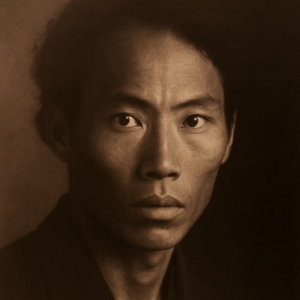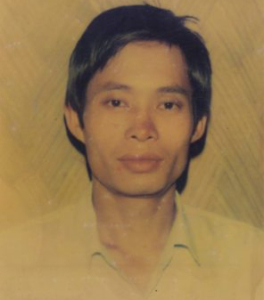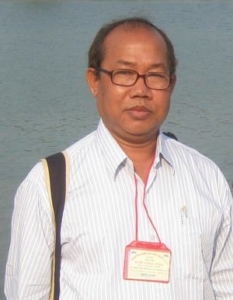Dr. Ramendu Shekhar Dewan: A Voice for the Jumma People on the Global Stage
![]()

Dr. Ramendu Shekor Dewan
Early Life of Dr. Dewan
Dr. Ramendu Shekhar Dewan (Dr. R S Dewan), who was born on 17 January 1932, hailed from the village of Khabongpojya of present Khagrachhari Hill District of Chittagong Hill Tracts (CHT), Bangladesh (then undivided India). His parents, Ramesh Chandra Dewan and Chandra Mukhi Dewan lovingly used to call him Kulkusum meaning that one day he would bring about sunshine in the family. He was the sixth of four sons and three daughters of the parents.
Student Life
He proved to be very meritorious student once he stared schooling at Khabongpojya Government Primary School. He was even awarded a government scholarship right at standard-II for his excellent brainpower.
During the period when R S Dewan was born, the CHT was quite undeveloped and hence there were only a few schools. Mohaprum, an erstwhile place close to Naniarchar of present Rangamti Hill District, had a school called Mohaprum Middle English School where most of the Jummas used to go there for studying up to standard VIII. A teacher named Chitto Kishore Chakma was an educationist, progressive and Jummas’ rights thinker who established this school for better education of Jumma peoples, came to know about the exceptional talent of R S Dewan.
It is to mention that Chitta Kishore Chakma was the brother-in-law of R S Dewan and father of the architect of Parbatya Chattagram Jana Samhati Samiti (PCJSS), Manabendra Narayan Larma and Jyotirindra Bodhipriya Larma. Krishna Kishore Chakma, a school inspector and a pioneer in the field of education in the Chittagong Hill Tracts, was elder brother of Chitta Kishore Chakma. The two brothers, Krishna Kishore Chakma and Chitta Kishore Chakma, started the work of spreading education among the backward people of the hills from this Mahaprum.
Chitta Kishore Chakma, who was also the headmaster of Mahaprum Middle English School at that time, went to R S Dewan and brought him to his school for admission. R S Dewan was admitted to standard III. In standard IV, he received a scholarship because of his excellent result in the exam. When he was in grade 7th, he took admission in Rangamati Government High School and passed the matriculation in 1953 securing first place in the first division group.
After he completed matriculation, he was admitted in Chittagong Government College for higher secondary class and passed it in 1955-56 securing first division. He then got admitted to Ahsan Ullah Engineering College in Dhaka, but he could not complete the course there. After studying for two years, he dropped it off in 1957 as he could not concentrate on his studies. Instead of studying, he went to work in the Kaptai Dam Construction Institute, a Utah, USA based company in Kaptai, CHT. He worked there for about one year and then again decided to pursue higher studies. So, he went back to Dhaka again and took admission for Chemistry (Honors) in Dhaka University in 1958 and completed it in 1961 and M.Sc. (Chemistry) in 1962.
On 3 November 1967, he set sail for England to study MPhil in Chemistry. He began his studying of MPhil under the guidance of Dr. Terry A. Rohan in 1968 in Queen Elizabeth College under London University. To maintain his educational expenses, he took a job under ‘Bush Boake Allen’ Company. One retired Lt. Col. Henry B Heath helped him get the job. By then the retired army officer was working with the company as Manager. During the World War-II, the army officer was deployed in CHT. He was awarded the title ‘Member of British Empire’ for his heroic role during World War-II.
After completion of MPhil which took four years, he began PhD in Chemistry at Salford University in Salford, Greater Manchester, England. Studying, campaigning for CHT issue and working to meet the study expenses altogether came to halt him from obtaining PhD degree. He had to work hard for his own living, expenses for the CHT campaign and university fees. Amid financial constraint, he was almost unable to go further and hence his education advisor advised him to apply for social benefit to complete his thesis. He did it. In 1980, he accomplished the goal of obtaining the degree successfully.
Political Life & Human Rights Activities:
Chitta Kishore Chakma was the inspiration of his political life. Mr. Chakma saw devasted situation of Jumma peoples and asked R S Dewan to work for the community. When R S Dewan studied in Rangamati Government High School in the early 50’s, he got involved in student politics and in mid50’s while studying in Chittagong, he became the General Secretary of Hill (Jumma) Students Association. It has been learnt that teachers like Chitta Kishore Chakma, politicians like Charu Bikash Chakma, Sudhangshu Shekhar Chakma, Sureshwar Chakma, Salil Roy inspired him to go ahead with politics. He organized the Jumma peoples for self-determination at different occasions.
Once he completed M.Sc. in Chemistry, he started working under the renowned scientist Dr. Muhammed Qudrat-E-Khuda. While working there, he faced allegation that he was involved in subversive activities against the government (then East Pakistan). Probably some haters informed the intelligence agencies of the government who kept him under surveillance and he faced unwanted interrogation. At certain time, Dr. Khuda advised him to step down from the job so that he would not be suspected anymore. But he remained adamant to do so and decided, if needed, to challenge against the allegation in the court. A director from the Department Intelligence Branch misbehaved with and warned him of various consequences.
He understood that the government had suspicious eye on him. So, he decided to go to UK to pursue higher studies and to work for the cause of Jumma peoples and hence he managed to get admission in Queen Elizabeth College under London University. In 1974, the then only Member of Parliament from the Jumma peoples, Manabendra Narayan Larma visited UK, met Ramendu Shekhar Dewan and requested him to be the spokesperson for the PCJSS. He honorably accepted it and started campaigning internationally and at the same time continued studying PhD.
Once he obtained the PhD degree, he continued campaigning in full swing instead of adhering to lucrative job because once he completed the course, he was offered lectureship in the same university. He attended the sessions of United Nations’ Permanent Forum on Indigenous Issues several times. He was the pioneer to bring the CHT issue to the international arena and received tremendous support from the international NGOs like Amnesty International, International Work Group on Indigenous Affairs (IWGIA), Survival International, Quaker Peace Services, Anti-Slavery Society, Organizing Committee on CHT Campaign to mention some. Once he reminisced about the unforgettable support of Peter Davis, a human rights activist of Anti- Slavery Society and Lord Avebury, a member of House of Lords in the British Parliament and also the Chairman of Parliamentary Human Rights Committee, without whose help he could not start an international campaign.
Dr. R S Dewan was a flawless patriot for the Jumma peoples’ rights. He was always assertive in his campaign that one day the Jumma peoples would be free from the Bangladesh Government’s domination.
His Simple Living & Last Days:
Dr. Dewan was a very simple man and hence led a simple life. Since he did not work and lived on the social benefits, he used most of his benefits for campaigning purposes. He used to get very little money weekly for his living and used most of them for printing, copying and disseminating the documents. Not only that, he even used to send some money to his near and dear’s kids for their expenses like buying toys, birthday celebrations, and so on.
He had an outdated typewriter which he used for compiling the human rights violations of the CHT until he passed away. Many NGOs came forward to buy new digital type writer and computer too, but he never accepted the offer. He did not want to depend on others. Even the PCJSS wanted to provide him some financial help, but he rejected.
As he had to spend money on sending documents or compiled documents, paper cuttings to different organizations, governments and individuals, his expenses went beyond limits. So, he cut off electricity line and telephone line to minimize the expenses preferring the need to disseminate human rights violations of the CHT.When COVID-19 started attacking almost everyone in UK, the Jumma peoples based there had difficulties to communicate with him frequently as he had no telephone line. Some Jumma families of UK still went to visit him in the first week of July, 2021 and they found that the bell was not ringing and after some times, the security guard came forward and opened the gate and when they went inside, tried to open the door and could not open it, the security guard came again and explained that when foul smelling was coming out of the apartment, police was informed, they came, broke the door and found that he was dead. So, the municipality authority came and took away his dead body, kept in a freezer and cremated on 28 June, 2021 the when they found that none was claiming the dead body. When contacted, they said that he passed away on March 29, 2021 (89 years old) and also said that they burnt all his belongings including all documents as nobody came to claim that somebody knew him or was his relative.
He might have died a miserable dead, but all Jumma peoples should salute him for his dedication, sacrifice and loving to Jumma nation and learn that it is the way of struggle we need to follow for our freedom.



